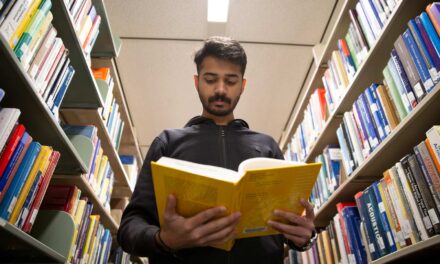
Young engineering faculty rapidly building a track record of innovation and high performance
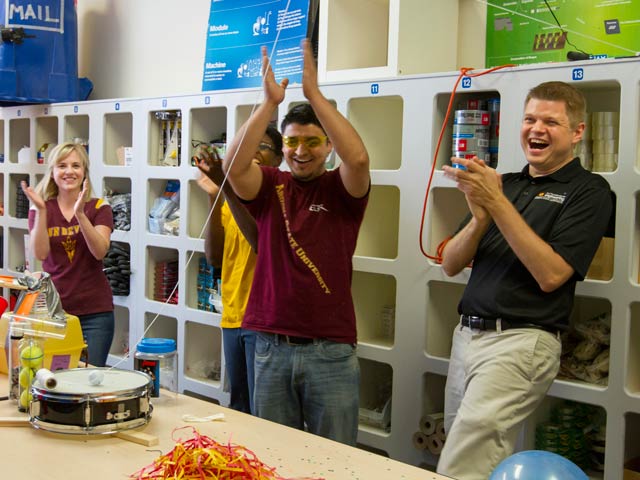
New awards this year bring two-year total to more than $11.5 million
High-performing innovation teams require the perfect combination of bright new talent and more experienced players.
It’s a strategy that is paying off for the Ira A. Fulton Schools of Engineering, which is building a track record of high performance by its young faculty members. A total of 20 prestigious awards have been netted over the past two years, bringing more than $11.5 million to support both research and education in the Fulton Schools.
These early career honors include the National Science Foundation (NSF) Early Faculty Development (CAREER) Program Awards, Air Force Office of Scientific Research Young Investigator Research Program (AFOSR YIP) Awards, National Institute of Health (NIH) Director’s and Career Development Awards, and Defense Advanced Research Projects Agency (DARPA) Young Faculty Awards.
This year already eight members of the faculty have been awarded CAREER and AFOSR YIP Awards. One researcher has doubled-down, receiving both a CAREER and YIP Award.
“These highly-competitive and prestigious grants are awarded to young faculty with the best ideas in the U.S. Our young faculty are amazingly innovative and are already pushing the boundaries of their fields,” said Paul Johnson, dean of the Ira A. Fulton Schools of Engineering. “In addition to being outstanding researchers, they are exceptional teachers, and their grant activities involve outreach to inspire the next generation of engineers.”
According to NSF, the CAREER Award “supports junior faculty who exemplify the role of teacher-scholars through outstanding research, excellent education and the integration of education and research within the context of the mission of their organizations.”
This year’s CAREER Award winners include:
 Pavan Turaga, assistant professor in the School of Electrical, Computer and Energy Engineering and School for Arts, Media + Engineering.
Pavan Turaga, assistant professor in the School of Electrical, Computer and Energy Engineering and School for Arts, Media + Engineering.
The award supports research to create new algorithms that can uncover underlying qualities of human movement. Turaga will create systems that can assess movement quality in home-based interventions for mobility disorders. This educational and outreach project focuses on informing technological innovations with humanistic insights, encouraging engineering students to draw on insights from the humanities and arts (and vice versa) and building hybrid digital-physical systems with interdisciplinary teams of students. Turaga teaches a course on motion capture for integrative systems where students from across disciplines create projects that span from interactive art installations to scientific projects involving interventions for mobility disorders.
 Liping Wang, assistant professor in the School for Engineering of Matter, Transport and Energy.
Liping Wang, assistant professor in the School for Engineering of Matter, Transport and Energy.
The fast depleting reserves of conventional energy sources and ever-changing environmental impacts have resulted in an urgent need for high-efficiency renewable energy sources and energy saving materials. Wang will use the award to focus on selectively controlling thermal radiation with novel man-made nanostructures. He will also develop an educational and outreach program, including but not limited to graduate and undergraduate student mentoring, invited seminars, international student/scholar exchange, and K-12 education to take every opportunity to train next-generation engineers and researchers in STEM.
 Jagannathan Rajagopalan, assistant professor in the School for Engineering of Matter, Transport and Energy.
Jagannathan Rajagopalan, assistant professor in the School for Engineering of Matter, Transport and Energy.
The award supports fundamental research that lays the foundation to employ nanocrystalline metals and alloys as smart, functional materials that have applications in aerospace, medicine and robotics. The research activity is integrated with a materials science education and outreach through a new mentoring program and scientific demonstrations for high school students, teacher workshops, course enhancements, and training of undergraduate and graduate students in multidisciplinary materials research.
 Sarah Stabenfeldt, assistant professor in the School of Biological and Health Systems Engineering.
Sarah Stabenfeldt, assistant professor in the School of Biological and Health Systems Engineering.
The award supports research that addresses fundamental gaps in understanding and modulating neural regeneration after brain injury. It will provide substantive research skill sets for the next generation of engineers and scientists, and a unique educational program will be developed for students ranging from high school to graduate school to actively conduct the proposed research. Additionally, Stabenfeldt will develop a guided-inquiry scientific module for high school students aimed at developing scientific analytical skills.
 Pingbo Tang, assistant professor in the School of Sustainable Engineering and the Built Environment.
Pingbo Tang, assistant professor in the School of Sustainable Engineering and the Built Environment.
The award will help pioneer a change-based risk analysis method that uses diverse spatiotemporal data for predictive defect detection of aging civil infrastructure systems and early warning of structural collapse for proactive infrastructure management. Change analysis games developed in this effort are to be integrated into the engineering curriculum, K-12 summer workshops, and industry outreach activities. A focus of this award is to engage people from underrepresented groups, especially Hispanics and Native Americans.
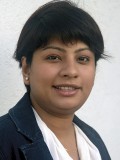 Srabanti Chowdhury, assistant professor in the School of Electrical, Computer and Energy Engineering.
Srabanti Chowdhury, assistant professor in the School of Electrical, Computer and Energy Engineering.
A significant amount of energy — more than 10 percent — is wasted as heat due to inefficient power conversion. The award will help Chowdhury develop a very low loss power transistor with an integrated drive circuit for power conversion applications. The solution will reduce or eliminate the wasted energy, thereby effectively extending the lifetime of available energy resources, adding global energy security and reducing greenhouse gas emissions. The educational and outreach components are aimed at fostering interest in Science, Technology, Engineering and Mathematics (STEM) disciplines and developing scientific knowledge at the undergraduate and K-12 levels. These activities are focused on working with a diverse group of students particularly women and other underrepresented groups.
 Oliver Kosut, assistant professor in the School of Electrical, Computer and Energy Engineering.
Oliver Kosut, assistant professor in the School of Electrical, Computer and Energy Engineering.
Wireless and wired network systems are subject to attack, and cannot be trustworthy until they operate reliably in the presence of an active adversary that alters the natural behavior of the system. This award funds research that provides new techniques to bolster the resilience of communication networks in the presence of these potentially damaging attacks, with an eye toward the fundamental trade-offs between security and performance. To be effective, these solutions need to be correctly understood and used by people. Kosut also will develop an education and outreach program for students of all ages about security vulnerability and protection for networked systems.
Air Force Office of Scientific Research Young Investigator Research Program The AFOSR YIP Award supports scientists and engineers who “show exceptional ability and promise for conducting basic research … and enhance early career development of outstanding young investigators.”
This year’s YIP awardees include:
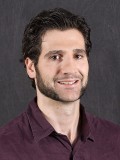 Paulo Shakarian, assistant professor in the School of Computing, Informatics, and Decision Systems Engineering.
Paulo Shakarian, assistant professor in the School of Computing, Informatics, and Decision Systems Engineering.
Getting a communication to “go viral” on social media is the goal of many public information and marketing efforts. Yet large information cascades are rare, suggesting they are difficult to engineer in practice. The award will advance research aimed at identifying what “inhibitory characteristics” in a social network cause a message to stop spreading and eventually die out. Shakarian’s work could aid in helping public service announcements reach multitudes of people during a health crisis or natural disaster.
Srabanti Chowdhury, assistant professor in the School of Electrical, Computer and Energy Engineering.
The award will advance research on transistor scaling technology that enables today’s high-speed electronics, like wireless communication and advanced imaging and radar, to operate at higher performance levels. The project takes a design-oriented approach exploiting the unique features of reciprocal space using III-Nitrides and Zinc Oxide to simultaneously achieve high power and high frequency performance.
Last year, 10 junior faculty members were recognized with prestigious early career awards, totaling 11 separate awards.
NSF CAREER:
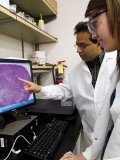 |
 |
| Vikram Kodibagkar, assistant professor in the School of Biological and Health Systems Engineering, “Quantitative Imaging of Tissue Oxygenation” | Ross Maciejewski, assistant professor in the School of Computing, Informatics, and Decision Systems Engineering, “A Visual Analytics Approach to Space-Time Data Exploration” |
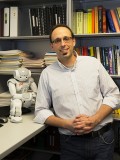 |
 |
| Georgios Fainekos, assistant professor in the School of Computing, Informatics, and Decision Systems Engineering, “Robustness Guided Testing and Verification for Cyber-Physical Systems” | Lalitha Sankar, assistant professor in the School of Electrical, Computer and Energy Engineering, “Privacy-Guaranteed Distribution Interactions in Critical Infrastructure Networks” |
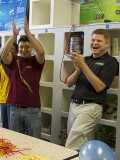 |
|
| Shawn Jordan, assistant professor in the Polytechnic School, “Engineering Design Across Navajo Culture Community and Society” |
NIH Director’s Award/Career Development Award:
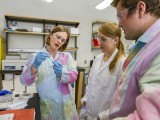 |
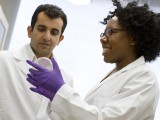
|
| Sarah Stabenfeldt (Director’s), assistant professor in the School of Biological and Health Systems Engineering, “Detecting and Treating Traumatic Brain Injury Pathology Progression from the Inside-Out” | Karmella Haynes (Training/Career Development), assistant professor in the School of Biological and Health Systems Engineering, “Synthetic Chromatin for Cancer Research” |
Defense Advanced Research Projects Agency (DARPA) Young Faculty Awards:
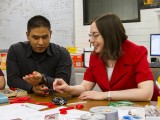 |
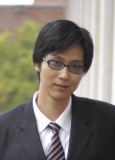 |
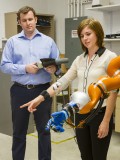 |
| Spring Berman, assistant professor in the School for Engineering of Matter, Transport and Energy, “Specification and Control of Customizable Multi-Robot Systems for Distributed Sensing and Cooperative Manipulation” | Yang Jiao, assistant professor in the School for Engineering of Matter, Transport and Energy, “Integrated Computational Scheme for the Characterization Modeling and Predicting of Microstructure Evolution and Fatigue Response in Titanium Alloys” | Panagiotis Artemiadis, assistant professor in the School for Engineering of Matter, Transport and Energy, “Optimizing human supervision of multi-agent systems” |
Air Force Office of Scientific Research Young Investigator Research Program (AFOSR YIP) Award:
Panagiotis Artemiadis, assistant professor in the School for Engineering of Matter, Transport and Energy, “Perception and action interfaces in the symbiosis of humans and multi-agent systems”
Read more about faculty awards in the Fulton Schools Fact Book
















